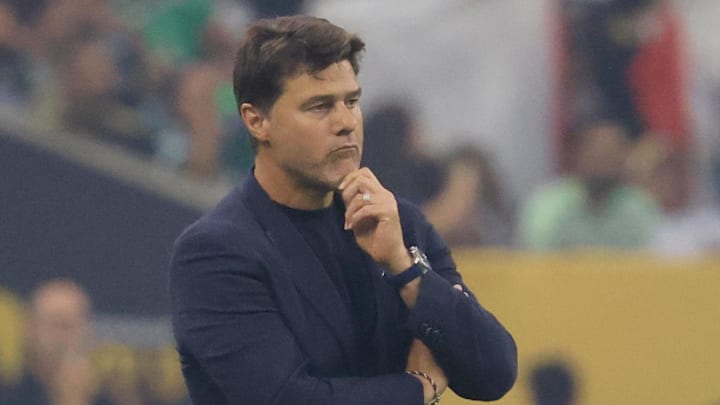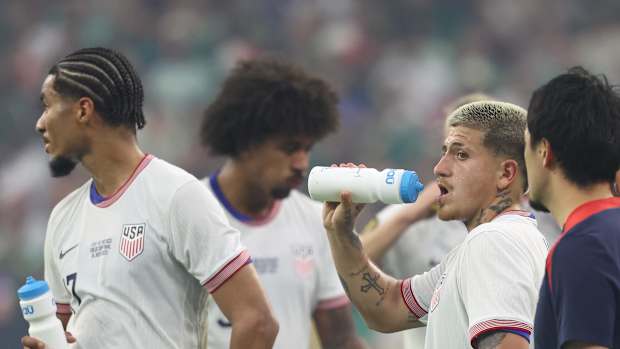Heartbreak for Pochettino as Mexico Triumphs in Gold Cup Showdown: Key Lessons from Defeat

The United States men's national soccer team recognized the significance of clinching the Concacaf Gold Cup final, but ultimately came up short against Mexico with a 2-1 defeat before a packed stadium of more than 72,000 spectators in Houston.
Despite the audience predominantly supporting El Tri, USMNT fans made their presence known throughout the match, particularly during the early phases when coach Mauricio Pochettino's squad attacked with intense momentum.
The Americans struck first in just the third minute when Chris Richards headed in a beautifully curved free kick delivered by Sebastian Berhalter to secure an early advantage. Though the ball ricocheted off the crossbar and bounced outward, the referee validated the goal without verification, as the Gold Cup lacks Goal-line Technology.
Mexico's response came swiftly, with Raúl Jiménez equalizing in the 27th minute, before Edson Àlvarez netted the decisive goal in the 77th minute to claim victory and Mexico's tenth Gold Cup championship.
Following this match, both teams will not participate in another competitive fixture until next year's FIFA World Cup.
Here are Sports Illustrated's three key observations from the USMNT's defeat.
Missed Opportunity

The USMNT had an opportunity to transform narratives heading into next year's FIFA World Cup with a victory against Mexico on Concacaf's grandest stage.
However, throughout Sunday's contest, attention shifted to absent players. It became clear that additional game-changing talent would likely have made the crucial difference. After previously dismissing discussions about missing stars, the focus reverted to those absences, overshadowing many positive aspects of their journey to the final.
While the tournament featured definite highlights, the final record shows the USMNT only defeating No. 100 Trinidad and Tobago, No. 83 Haiti, No. 58 Saudi Arabia, and No. 106 Guatemala, requiring penalties to overcome No. 54 Costa Rica, before losing to No. 17 Mexico.
The victories provided brief moments of relief this summer, following friendly losses to Türkiye and Switzerland. Nevertheless, it was apparent that issues within the USMNT persisted, as they again failed to deliver in crucial moments against highly competitive opposition.
Now, Pochettino and his team must evaluate their performances against both smaller nations and stronger opponents like Mexico, Switzerland, and Türkiye to determine necessary adjustments before facing superior competition next summer.
Berhalter Is the USMNT's Set Piece Taker for the World Cup

When numerous key USMNT stars announced their unavailability for the Gold Cup, it created chances for lesser-known players to prove themselves or, as Pochettino stated before the tournament, have "the possibility to defend your place."
While several players rose to the occasion, no newcomer stood out more than Sebastian Berhalter. The son of former USMNT head coach Gregg Berhalter showcased his versatility, functioning either as a ball-advancing defensive midfielder or, as demonstrated in the final, a balanced right midfielder.
Though he delivered outstanding performances throughout the tournament, his finest display came against Mexico, beginning with a perfectly curled free-kick that assisted Richards' opening goal, reminiscent of their connection in the 1-0 victory over Saudi Arabia.
Subsequently, he created two additional scoring opportunities and delivered six passes into the final third in a relatively commanding wide performance. Later in the match, he shifted to a central position to allow fullbacks to advance, as illustrated in the map below.

However, his set-piece proficiency was the tournament's standout feature. Entrusted with dead ball responsibilities, the Vancouver Whitecaps FC midfielder generated threatening opportunities unlike anything the USMNT has witnessed in recent years.
This skill set likely places him in strong contention for next year's World Cup roster, potentially even as a starter, given the underwhelming set-piece delivery from other players, including Christian Pulisic.
Race for the Roster Heats Up

Despite lacking elite players on this year's Gold Cup roster, performances across the squad provided insight into how competition for the 23 or 26-man World Cup roster might unfold.
Throughout the tournament and in the final, the central defensive partnership of Richards and Tim Ream likely cemented their status as the preferred duo moving forward. Simultaneously, Alex Freeman and Max Arfsten displayed impressive moments that could secure them squad positions.
Additionally, midfielders delivered significant performances across the board, with Berhalter, Luca de la Torre, Diego Luna, and Timothy Tillman all demonstrating their potential to play crucial roles alongside Tyler Adams and other first-choice American players.
However, no position presents as much intrigue or competition following this summer's Gold Cup as goalkeeper, with no clear first-choice heading into the future. Matt Freese distinguished himself as a starter after taking over from Matt Turner, while other goalkeepers like Zack Steffen and Patrick Schulte remained sidelined due to injuries.
Though the final didn't unfold as the USMNT had hoped, they certainly gained valuable benefits from the Gold Cup in terms of fostering competitive selection battles for the World Cup roster.